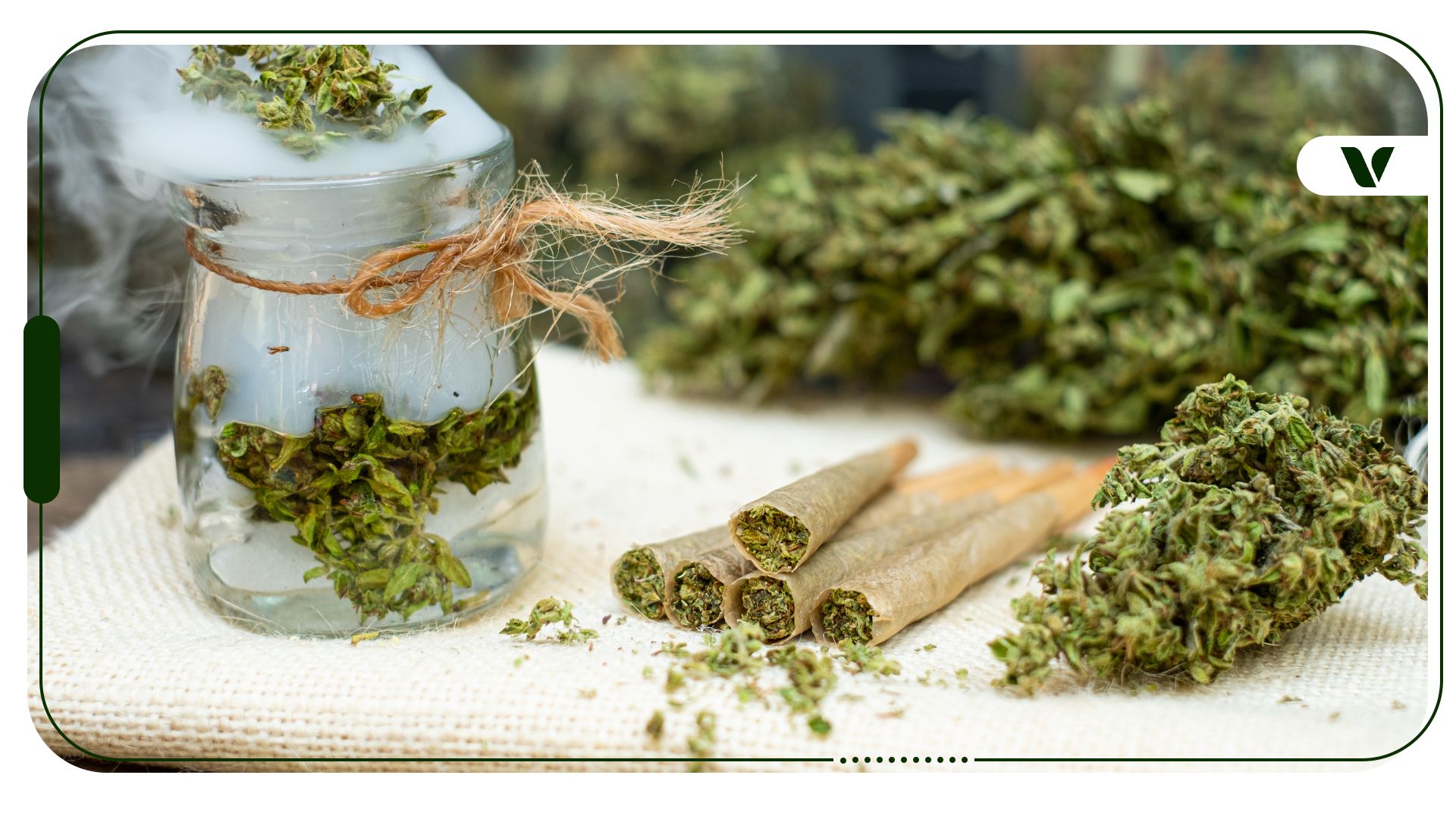Cymbalta is a drug used for several purposes, including anxiety, depression, and chronic pain — conditions that also appear on many state lists of approved uses for medical marijuana. Patients who have been prescribed Cymbalta may have questions about whether the drug can be taken alongside medical marijuana or if medical cannabis can serve as a replacement for Cymbalta. In this article, we’ll help you find answers to those questions and more.
What Is Cymbalta?
Cymbalta, also known as duloxetine, is a serotonin and norepinephrine reuptake inhibitor (SNRI). As the name implies, SNRIs increase the serotonin and norepinephrine in the brain. These chemicals help regulate moods, pain, and other important bodily functions, and Cymbalta influences the levels of those chemicals in the brain.
It comes in the form of a capsule that you take with water or another drink. The standard capsule immediately releases the medicine, providing a quick and strong benefit, while the delayed-release capsule slowly releases the medicine into your system, to produce a milder effect that lasts longer.
Cymbalta’s side effects range from mild to severe. Common and minor side effects include aches, frequent urination, excessive sweating, sleep issues, and weight loss. Rarer side effects include digestive issues and sexual problems.
In certain cases, a patient can experience withdrawal symptoms after abruptly stopping use. Some relate to muscle control, such as muscle spasms, tremors, coordination problems, overactive reflexes, and loss of bladder control. Others relate to overstimulation, like agitation, restlessness, sleep issues, and uncontrollable excitement. Do not stop taking Cymbalta without first consulting your doctor.
If you use Cymbalta for depression, be aware it may worsen your depression symptoms. If you deal with increased depression when you take it, contact your doctor or pharmacist right away.
Is It Safe To Combine Cymbalta and Weed?
While Cymbalta and marijuana can be used for similar purposes, you should use caution if you take them together. Some of their side effects are also similar, meaning they could be magnified if the two substances are combined.
The problems occurring when the two drugs interact tend to be related to cognitive and motor function. Cognitive side effects include concentration problems, confusion, impaired judgment, and difficulty thinking. Motor side effects include impaired coordination and dizziness. These side effects can become even worse when you use alcohol.
Drugs.com classifies the interaction between Cymbalta and marijuana as moderate. According to the site’s guide, doctors should recommend the combination only in special circumstances. If you and your doctor decide that the benefits outweigh the risks and you want to try taking both together, closely monitor your symptoms and stay in touch with your physician.
Why You Should Get Your Medical Marijuana Card
Veriheal has satisfied millions of patients nationwide by giving them access to these benefits
- Larger purchase limits
- Peace of mind
- Enhanced legal protection
- Access to higher potency strains
- Save up to 25% on cannabis purchases
- Skip the line at the dispensary
Potential Benefits and Risks of Mixing Cymbalta and Marijuana
While Cymbalta is often prescribed to treat depression, anxiety, and chronic pain, some users may turn to marijuana for additional relief. However, combining the two substances can result in both potential benefits and risks. Therefore, it’s important to understand how these interactions could impact your health before considering this combination.
Potential Benefits
Marijuana has been shown to provide relief from a wide variety of conditions, including those for which doctors prescribe Cymbalta.
Marijuana may relieve depression symptoms, for example. Research has shown that patients who use medical marijuana experience less depression than patients who don’t use it, although scientists still don’t quite understand what makes cannabis effective at treating mood disorders.
Cannabis can ease anxiety as well. One of the major components of marijuana, cannabidiol (CBD), was found to reduce anxiety in clinical trial subjects. However, since marijuana can also heighten anxiety in certain people, monitor your symptoms closely if you medicate with cannabis.
Potential Risks
One of the primary concerns is the potential for increased side effects, such as dizziness, confusion, or drowsiness, which can impair motor skills and cognitive function. This could raise the risk of accidents, particularly when performing activities like driving. Cannabis can also elevate serotonin levels, there is a potential risk of serotonin syndrome when combined with Cymbalta. This is a dangerous condition characterized by symptoms such as rapid heart rate, high blood pressure, fever, and seizures.
Additionally, long-term use of both substances together may increase the likelihood of developing tolerance or dependency, which could make managing symptoms more challenging over time. There’s also limited research on how cannabis affects Cymbalta’s metabolism, meaning that some users may experience unpredictable drug interactions.
Final Thoughts
When considering the combination of duloxetine and weed, it’s crucial to approach it with caution and under the guidance of a healthcare professional. While both substances can offer relief from similar conditions such as anxiety, depression, and chronic pain, mixing them may lead to heightened side effects or unpredictable interactions.
Always consult your healthcare provider before making any changes to your medication regimen, and closely monitor your body’s response if you choose to combine these substances. For some, the potential benefits of combining Cymbalta with medical marijuana may outweigh the risks, but this is not the case for everyone.
Frequently Asked Questions
Can you smoke on duloxetine?
Smoking marijuana while taking duloxetine (Cymbalta) is not recommended without consulting your doctor. The combination may increase the risk of side effects like dizziness, confusion, and impaired motor skills. It’s important to monitor your symptoms closely if you decide to use both.
What should I avoid when taking Cymbalta?
When taking Cymbalta, avoid alcohol and other substances that can increase drowsiness, such as sedatives or muscle relaxers. Combining these can heighten side effects like dizziness, impaired coordination, and cognitive issues. Always check with your doctor before using any new medication or supplement.
Author, Share & Comments








